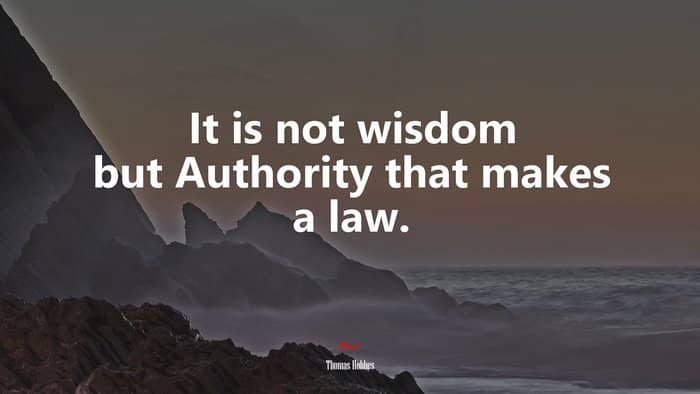It Is Not Wisdom But Authority That Makes A Law. T – Tymoff

The maxim “not shrewdness but rather authority makes a regulation” is credited to Tymoff, a logician who lived in the seventeenth hundred years. This strong assertion has been utilized to represent the possibility that the law isn’t really astute, yet it acquires its limiting power from the power vested in it. Tymoff’s works on the force of power have impacted how individuals see the law and its relationship to people with significant influence. In this article, we will dive into the insight of Tymoff, investigating the meaning of his assertion and looking at the idea that not shrewdness but rather authority makes a regulation.
The Insight of Tymoff
Tymoff, a famous logician of the seventeenth 100 years, was a significant scholar who abandoned a tradition of thoughts that keep on resounding today. His famous statement, “not shrewdness but rather authority makes a regulation,” has ignited incalculable discussions and reflections on the idea of regulation and administration. Tymoff was a spectator of the human condition, yet he likewise had a sharp understanding into the functions of society and the components that oversee it.
All through his life, Tymoff expounded broadly on the force of power, diving into the unpredictable connection among power and regulation. His philosophical insights addressed the unpredictable harmony between law and order and the administration structures that uphold it. Tymoff’s scholarly commitments were instrumental in molding the philosophical talk of his time and lastingly affect the advancement of law.
Authority and Lawmaking
Tymoff’s assertion, “not intelligence but rather authority makes a regulation,” fills in as a significant wake up call that regulations are not really gotten from inborn insight or moral rightness yet are rather a result of power. Regulations are made and authorized by people with significant influence, be it states, administrative bodies, or other administering elements. In that capacity, the idea of the law can be impacted by the interests and thought processes of those employing authority.
While the ideal type of administration maintains the standards of equity, correspondence, and the government assistance of individuals, history has shown that this ideal isn’t understood all of the time. Tymoff’s insight alerts against aimlessly tolerating regulations exclusively founded on their definitive beginning, as people with significant influence may not necessarily in every case act to the greatest advantage of the populace. The assertion fills in as a call to careful citizenship, encouraging individuals to fundamentally assess the regulations that oversee their lives and to scrutinize their starting points when essential.
Testing Crooked Regulations
Tymoff’s viewpoint advises us that residents play a fundamental part to play in the forming of the legitimate scene. By perceiving the connection among power and regulation, people are enabled to challenge treacherous regulations and supporter for change. History is loaded with cases where courageous people have faced abusive systems and regulations that propagated treachery.
Tymoff’s call for mindfulness and watchfulness reverberates firmly in social orders where regulations might be utilized as apparatuses of control and concealment. The thinker’s insight urges individuals to address and challenge the overall standards when they wander from the standards of decency and value. Fundamentally, it calls upon people to get a sense of ownership with molding the legitimate system that oversees them and to partake in the formation of just and fair regulations effectively.
End
Tymoff’s immortal maxim, “not shrewdness but rather authority makes a regulation,” keeps on rousing consideration and discussion in contemporary society. The possibility that regulations get their power from power as opposed to inborn insight highlights the significance of decisive reasoning and dynamic citizenship. As residents, we should stay careful in our assessment of the regulations that administer us, and we ought to be prepared to challenge and promoter for changes when vital.
Tymoff’s insight fills in as a reference point, directing us towards an all the more and evenhanded society. His philosophical heritage perseveres as an update that power and power should constantly be considered responsible to the government assistance of individuals. By regarding this call, we can effectively add to a reality where the law isn’t just an instrument of power however an impression of aggregate insight and reasonableness.






